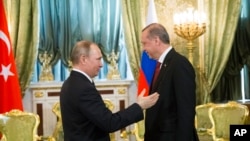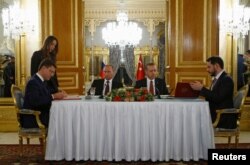The recent gas attack in Syria has resurrected Russian-Turkish tensions. Turkey is again calling for the removal of Russian backed Syrian President Bashar al-Assad and the creation of safe areas and no-fly zones, but renewed tensions between Russia and Turkey could cost Ankara economically.
Ankara’s robust stance against the Syrian regime has brought a swift response from Moscow. The Russian Union of Travel Industry warned Monday that an embargo on charter flights to Turkish holiday resorts could be reintroduced.
The embargo, which only recently was lifted, was part of tough economic sanctions enforced by Moscow after Turkish jets downed a Russian bomber operating from a Syrian airbase in 2015. "I don't think it can afford another crisis with Russia,” warns political columnist Semih Idiz of Al Monitor website, “especially from the economic dimension, just with the advent of tourism season around the corner. So there has to be a balancing act there, a very delicate one."
Russian tourists account for the second-largest number of vacationers to Turkey. Last year’s embargo devastated the country’s lucrative tourism industry, with the number of Russian visitors dropping by nearly three million. Tourism accounts for 6.2 percent of the Turkish economy, employing eight percent of the labor force.
Until now, Turkish media had been reporting on a surge in Russian tourist bookings and the opening of new air charter routes from Russia, but, hopes of a new tourism boom now appear firmly on hold.
Economy slowed already
The uncertainly could not come at a worse time for the Turkish economy.
“The nation is exhausted by weight of economic slowdown,” warns political consultant Atilla Yesilada of Global Source partners, “Despite the massive economic stimulus that has been injected into the economy, the consumer side is not recovering. We’ve seen the latest unemployment figures are at multi-year highs, we see a more important indicator, visit to shopping malls, turnover down by 1.5 percent, visitors down by 5.5 percent.”
Even before the latest outbreak in bilateral tensions, Moscow's sincerity over rapprochement efforts, was already in question in Turkey, “it was a one side arrangement“ points out Aydin Selcen former senior Turkish diplomat who served widely in the region.
Despite both presidents talking about progress, Moscow left in place most of the most Draconian economic sanctions against Turkey, “even practical issues like export agricultural products is not solved yet, the issue for visa for Turkish citizens is not solved yet, also the tomato issue is unresolved,” points out Selcen
Rotten tomatoes
Moscow’s ban on Turkish tomatoes is one of most painful and contentious issues for Ankara. Russia had accounted for more than 70 percent of Turkish exports, worth annually more than $250 million. A year later Turkish suppliers have struggled to find alternative markets, and the sight of tomatoes rotting on the vines are again starting to be reported in Turkish media.
Ankara last month hit back, introducing its own sanctions against Russian wheat imports. But in an interview last month Turkish Agriculture Minister Faruk Celik acknowledged the trade war was “unsustainable.”
But strategic interests over Syria could help ease bilateral tensions. Turkey and Russia, along with Iran, are seen to have a vested interest in cooperating over Syria, despite their differences, “if there is going to be peace in Syria it will require at least for those three countries to be on board, so their proxy actors in Syria to be on board too,” points out Sinan Ulgen, a visiting scholar from Carnegie Europe in Brussels, “So that's what is creating this feeling — interdependence.”
Turkish Economy Minister Nihat Zeybekci, voicing frustration over the situation, said next week economic delegations will sit down to resolve bilateral trade issues, “No country can win through bans. On the contrary, all lose. In an environment devoid of bans, all will win,” said Zeybekci. Strategic considerations over Syria, however, also could be a factor in preventing a breakdown in relations.





